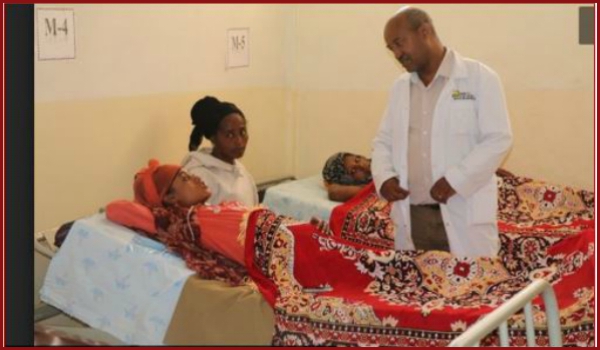
In one room, a line of young women – accompanied by men and in some cases their mothers – await vaccinations for their newborns. In two more rooms down the terrace, midwives provide post-natal care to women who have just given birth. And in a nearby recovery room, six women rest in comfortable beds following safe second trimester abortions. This is another normal day at the recently-opened Michu (which means ‘comfort’ in Amharic) Clinic at Adama Hospital Medical College in Adama, Ethiopia. On average, the clinic sees 100–120 girls and women every day, including Saturdays. Teams of nurses and midwives also provide family planning, counselling, and contraceptive commodities to both men and women. As many as 50 people may be waiting to be seen at any one moment.
The hospital and medical college serve a catchment area of more than five million in the Oromia region and educate 149 medical students and 40 residents. The surging demand for family planning and abortion services convinced Provost Dr Silashii Gaaromaa Abbayyaa that he had to turn his office building into a clinic.
The hospital in Adama has a tradition of ground-breaking activity. Established in 1938, it was the first missionary hospital in Ethiopia. In 2008, the College of Health Science Education was created. The Michu clinic is one of 12 that have opened across Ethiopia at university hospitals in partnership with the Center for International Reproductive Health at the University of Michigan (CIRHT).
Dr Silashii explains: “Safe motherhood is a national priority, and family planning and safe abortion care are pillars of ensuring safe motherhood. When abortion was legalised in certain circumstances in 2006, the complications from unsafe abortion accounted for 32% of maternal mortality. Over the past few years, that number has dropped consistently and now sits at less than 13%. Adama was one of the first places to perform second trimester abortions, and from that work helped to establish national guidelines and procedures. But when the clinic was not in a separate area, women suffered. So it was important to create a separate space conducive for all types of clients.”
The impact of the new clinic has been immediate. More women are now being provided with a cross-section of reproductive health services and their satisfaction with the health care is high. Dr Fikru Abebe is an OB-Gyn who has been the local champion for integrating pre-service training in family planning and comprehensive abortion care at the college. “We want more family planning so we have less need for abortion. We need to raise awareness. It’s all integrated and inter-related, even with the antenatal and post-natal clinics, a part of giving the woman the health care she wants. And if you serve one woman with services and information, then she will go tell other women, and the awareness will grow.”
…As he walked through the post-abortion recovery room, the patients all signaled their satisfaction. “I feel comfortable here,” one woman told him. “Women were waiting too long for second trimester abortion services before. We couldn’t serve the flow of patients. Now we are doing six or so per day.”
The emphasis on family planning service is evident throughout the hospital… The increase in use of post-partum family planning has been dramatic, as well as the uptake of family planning in general – up 57% – and safe abortion care – up 60% …
Reducing stigma is also key. Having a separate clinic is one way of addressing that predisposition. Everybody at the hospital has gone through Value Clarification & Attitude Transformation training – students, residents, nurses, midwives and all staff, including the guards. For Dr Fikru, that is what makes the clinic effective. “If everybody in the hospital knows what we are doing, we don’t have a problem with negative attitudes. One of the key things for a woman having an abortion is privacy and confidentiality. So a woman can come directly here to this clinic without any fear. When women are comfortable the demand increases. There may come a time when we have a space problem again and need to expand. But for now if a woman comes for a service, without an appointment, she will be served and will go home without any problem.”
SOURCE: CIHRT News, 21 June 2018



